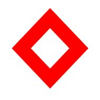What makes a culture dismiss another's symbols as being offensive? If you have a neutral attitude on the use of a cross symbol to denote health care then it is likely you are from a permissive or largely Christian society or background. Some people in the World will take offence to the cross symbol.
Watching a medical acute-care presentation the other day I saw that the symbol for death within a graph was a cross. This is meant to indicate a tombstone (headstone. In the UK, where Christian burial sites are scattered with cross-shaped symbols this might be decoded correctly much of the time. Elsewhere the symbol could confuse on a number of levels, not least that the symbol of the Saviour (life) being used to denote the negative of death, or the misinterpretation by faith groups that use other symbols in their burials.
If we are to develop symbols in learning software that are guaranteed correctly decoded by customers from different faith, cultural, and geographic backgrounds or which do not cause distraction from actual or implied offence, then we may need to be more deliberate in our design of graphics in learning.
I'm focussing on icons for medical education. Many are tangible representations of equipment that are easily recognised across the globe but if I use an 'A' for Airway is it universal? What's the French, Russian, or Chinese for Airway, and why would a Korean care for an 'A'? If the software were to be exported, what would replace it: and if replaced could the new symbol confuse others on subsequent cross-cultural export?
 As a starter for ten, the simplest and most misunderstood complication of a symbol in the medical world is the cross. The ICRC (Committee of Red Cross / Crescent) have even designed a new symbol to remove the religious fervour that drowns out their good work. It's a diamond shape they call a "crystal" so as not to cause their needing to change their title.
As a starter for ten, the simplest and most misunderstood complication of a symbol in the medical world is the cross. The ICRC (Committee of Red Cross / Crescent) have even designed a new symbol to remove the religious fervour that drowns out their good work. It's a diamond shape they call a "crystal" so as not to cause their needing to change their title.
 During debate on the origin of the Red Cross I am frequently told the red cross is the reverse of the Swiss national flag (home of the Geneva Convention), and therefore only accidentally a Christian-style cross, and that it shouldn't worry Islamic folk.
During debate on the origin of the Red Cross I am frequently told the red cross is the reverse of the Swiss national flag (home of the Geneva Convention), and therefore only accidentally a Christian-style cross, and that it shouldn't worry Islamic folk.
"...The flag looks back upon 700 years of history...By the early Middle Ages the cross was commonly used on coins and seals and, as a symbol of the Christian faith, it was carried into battle on the banners of the various warring parties..."
http://www.eda.admin.ch.
 The cross debate doesn't stop there. The Green Cross is used by European pharmacies as a symbol on the front of their premises. In the UK, I remember pharmacies displaying the symbol of a perfume bottle, or such like, and a pestle and mortar in other lands. Is this not a play on the medical meaning of the Red Cross in a Christian society? Green is a popular colour of Islam. Was the colouring of the cross green a coincidence? Even then, other religious beliefs are occluded. Perhaps this too should become a crystal?
The cross debate doesn't stop there. The Green Cross is used by European pharmacies as a symbol on the front of their premises. In the UK, I remember pharmacies displaying the symbol of a perfume bottle, or such like, and a pestle and mortar in other lands. Is this not a play on the medical meaning of the Red Cross in a Christian society? Green is a popular colour of Islam. Was the colouring of the cross green a coincidence? Even then, other religious beliefs are occluded. Perhaps this too should become a crystal?
In the UK, where two main road routes or two rail tracks intersect through one another these are called cross-roads. The symbol for a road junction cross roads is an upright cross: for a rail cross-roads it's an 'X'. In middle-eastern countries I've visited the road intersection is called an intersection and its symbol is 'X'.
The very word "cross" means to intersect and can be a "+" or "X", or anything in between. Christ was crucified (the cruciform word eventually deriving "cross", I understand). This symbolic sacrifice to mankind gave rise to the use of the cross as the symbol for the Christian faith. Given that Christians and Muslims have crossed swords and rifles through the centuries it's probably reasonable to understand that the symbol of one might upset the other? Certainly, the use of the red cross symbol by the middle-ages' crusaders must have given it a bad press?
 There's info on the Islamic crescent at this site (islam.about.com). The crescent is explained (in a similar way to the cross in the Christian faith) to derive from a symbol preceding the faith. It's interesting then, that Portsmouth Football Club (UK) uses the symbol in its club badge given Portsmouth is sited in a predominantly Christian culture.
There's info on the Islamic crescent at this site (islam.about.com). The crescent is explained (in a similar way to the cross in the Christian faith) to derive from a symbol preceding the faith. It's interesting then, that Portsmouth Football Club (UK) uses the symbol in its club badge given Portsmouth is sited in a predominantly Christian culture.

Watching a medical acute-care presentation the other day I saw that the symbol for death within a graph was a cross. This is meant to indicate a tombstone (headstone. In the UK, where Christian burial sites are scattered with cross-shaped symbols this might be decoded correctly much of the time. Elsewhere the symbol could confuse on a number of levels, not least that the symbol of the Saviour (life) being used to denote the negative of death, or the misinterpretation by faith groups that use other symbols in their burials.
If we are to develop symbols in learning software that are guaranteed correctly decoded by customers from different faith, cultural, and geographic backgrounds or which do not cause distraction from actual or implied offence, then we may need to be more deliberate in our design of graphics in learning.
I'm focussing on icons for medical education. Many are tangible representations of equipment that are easily recognised across the globe but if I use an 'A' for Airway is it universal? What's the French, Russian, or Chinese for Airway, and why would a Korean care for an 'A'? If the software were to be exported, what would replace it: and if replaced could the new symbol confuse others on subsequent cross-cultural export?
 As a starter for ten, the simplest and most misunderstood complication of a symbol in the medical world is the cross. The ICRC (Committee of Red Cross / Crescent) have even designed a new symbol to remove the religious fervour that drowns out their good work. It's a diamond shape they call a "crystal" so as not to cause their needing to change their title.
As a starter for ten, the simplest and most misunderstood complication of a symbol in the medical world is the cross. The ICRC (Committee of Red Cross / Crescent) have even designed a new symbol to remove the religious fervour that drowns out their good work. It's a diamond shape they call a "crystal" so as not to cause their needing to change their title. During debate on the origin of the Red Cross I am frequently told the red cross is the reverse of the Swiss national flag (home of the Geneva Convention), and therefore only accidentally a Christian-style cross, and that it shouldn't worry Islamic folk.
During debate on the origin of the Red Cross I am frequently told the red cross is the reverse of the Swiss national flag (home of the Geneva Convention), and therefore only accidentally a Christian-style cross, and that it shouldn't worry Islamic folk."...The flag looks back upon 700 years of history...By the early Middle Ages the cross was commonly used on coins and seals and, as a symbol of the Christian faith, it was carried into battle on the banners of the various warring parties..."
http://www.eda.admin.ch.
 The cross debate doesn't stop there. The Green Cross is used by European pharmacies as a symbol on the front of their premises. In the UK, I remember pharmacies displaying the symbol of a perfume bottle, or such like, and a pestle and mortar in other lands. Is this not a play on the medical meaning of the Red Cross in a Christian society? Green is a popular colour of Islam. Was the colouring of the cross green a coincidence? Even then, other religious beliefs are occluded. Perhaps this too should become a crystal?
The cross debate doesn't stop there. The Green Cross is used by European pharmacies as a symbol on the front of their premises. In the UK, I remember pharmacies displaying the symbol of a perfume bottle, or such like, and a pestle and mortar in other lands. Is this not a play on the medical meaning of the Red Cross in a Christian society? Green is a popular colour of Islam. Was the colouring of the cross green a coincidence? Even then, other religious beliefs are occluded. Perhaps this too should become a crystal?In the UK, where two main road routes or two rail tracks intersect through one another these are called cross-roads. The symbol for a road junction cross roads is an upright cross: for a rail cross-roads it's an 'X'. In middle-eastern countries I've visited the road intersection is called an intersection and its symbol is 'X'.
The very word "cross" means to intersect and can be a "+" or "X", or anything in between. Christ was crucified (the cruciform word eventually deriving "cross", I understand). This symbolic sacrifice to mankind gave rise to the use of the cross as the symbol for the Christian faith. Given that Christians and Muslims have crossed swords and rifles through the centuries it's probably reasonable to understand that the symbol of one might upset the other? Certainly, the use of the red cross symbol by the middle-ages' crusaders must have given it a bad press?
 There's info on the Islamic crescent at this site (islam.about.com). The crescent is explained (in a similar way to the cross in the Christian faith) to derive from a symbol preceding the faith. It's interesting then, that Portsmouth Football Club (UK) uses the symbol in its club badge given Portsmouth is sited in a predominantly Christian culture.
There's info on the Islamic crescent at this site (islam.about.com). The crescent is explained (in a similar way to the cross in the Christian faith) to derive from a symbol preceding the faith. It's interesting then, that Portsmouth Football Club (UK) uses the symbol in its club badge given Portsmouth is sited in a predominantly Christian culture. 
No comments:
Post a Comment